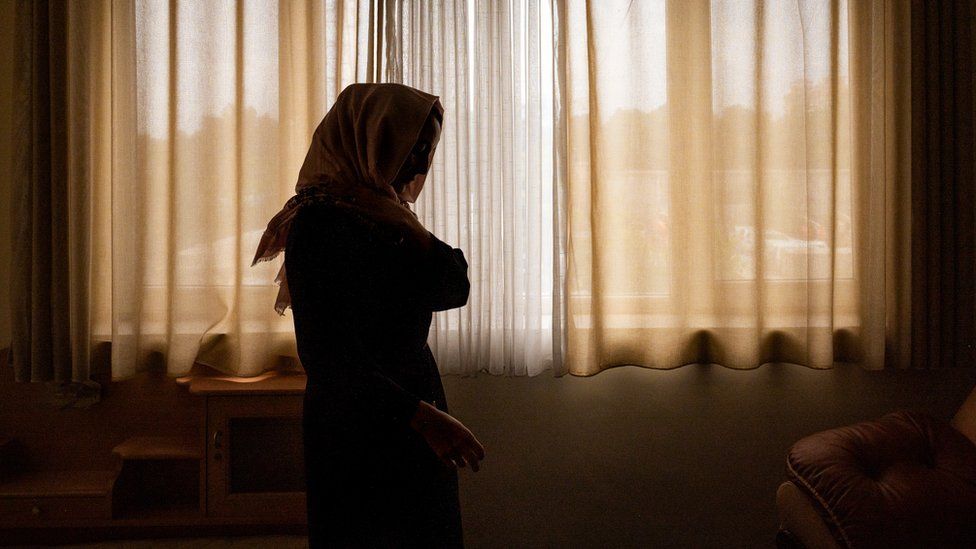
The secrets shared by Afghan women
The pen name Paranda means 'bird'
By Lyse Doucet and Zarghuna Kargar
BBC News
"My pen is the wing of a bird; it will tell you those thoughts we are not allowed to think, those dreams we are not allowed to dream."
At times, voices of Afghan women rise from the streets of Kabul and other cities in small, loud, protests. Often, they ring out in speeches by women now far away, outside Afghanistan. But mostly, their thoughts are only expressed quietly, in safe places. Or they fester in their heads as they try to reconcile their lives with the increasingly rigid rules of the Taliban government. They restrict what women wear, where they work, what they can do, or not, with their lives.
In the months before the Taliban returned, in August 2021, 18 Afghan women writers wrote fictional stories, drawn from real lives, and published early this year in the book, My Pen is the Wing of a Bird. Many Afghan women felt let down and left alone by the international community. But these writers used their pens and phones to comfort each other and to reflect on issues now faced by millions of women and girls. Here, two writers in Kabul, with pen names Paranda and Sadaf, shared their thoughts written in secret.
'Is a pink scarf a sin?'
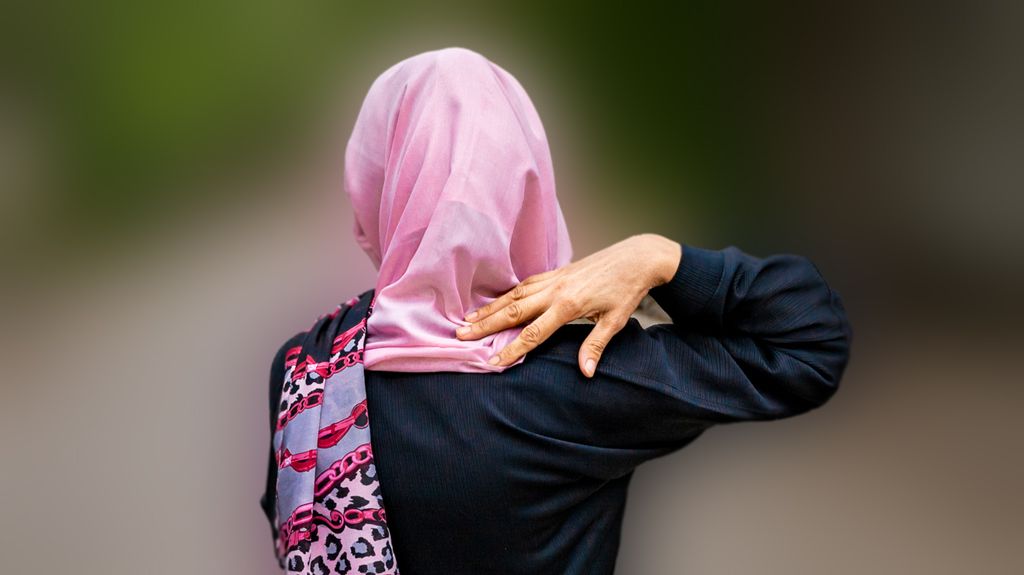
Paranda walks down the street wearing her pink scarf
"Today I woke up with determination. When I chose my clothes, I decided to wear a pink headscarf to fight with the black headscarf I wear daily... is it a sin to wear a pink headscarf?"
Paranda prefers to wear pink, to feel feminine. But what women choose to put on is now a battleground. Strict Taliban edicts on modesty are enforced, often forcefully. In this traditional society, Afghan women aren't fighting against head-coverings - some just want their right to choose. You see it on the streets, in public spaces. A pink scarf. A sparkling trim. A little light in the dark.
'We cannot go back'
"Going backwards is not easy. Going forward is also a big hassle, should I be hopeful or not? We cannot go back," writes poet Hafizullah Hamim.
Afghan women have been leading the charge in rare public protests. Small brave crowds have taken to the streets in Kabul and other cities brandishing banners calling for "bread, work, freedom." They've been forcibly dispersed, and detained. Some have disappeared in detention. Across the border, in Iran, it's also the women leading calls for change with cries of "women, life, freedom" and a demand to end mandatory hijab. For Afghans, it's the right of women to work, for girls to be educated.
'Fear turns to anger'
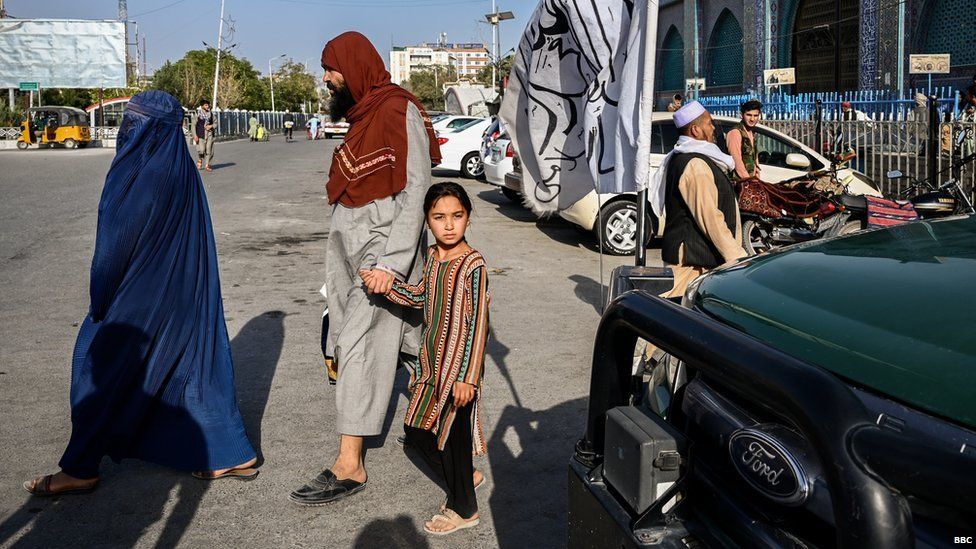
Checkpoint in Mazar-i-Sharif
''The Taliban guard stopped our office car, he pointed at me… my heart beat faster, my body shook. It felt as if a wind was blowing across me... when our car moved away, it felt like the wind moved in another direction. My fear turned to anger."
It's the unpredictability that is so hard. Some Taliban guards are aggressive, some more accepting. Women's journeys are nerve jangling. For long distances over 72km (45 miles), a mahram - a male escort - is mandatory. Some Talibs invoke the rule at will - sending women home on a whim.
'Excitement of ice cream'
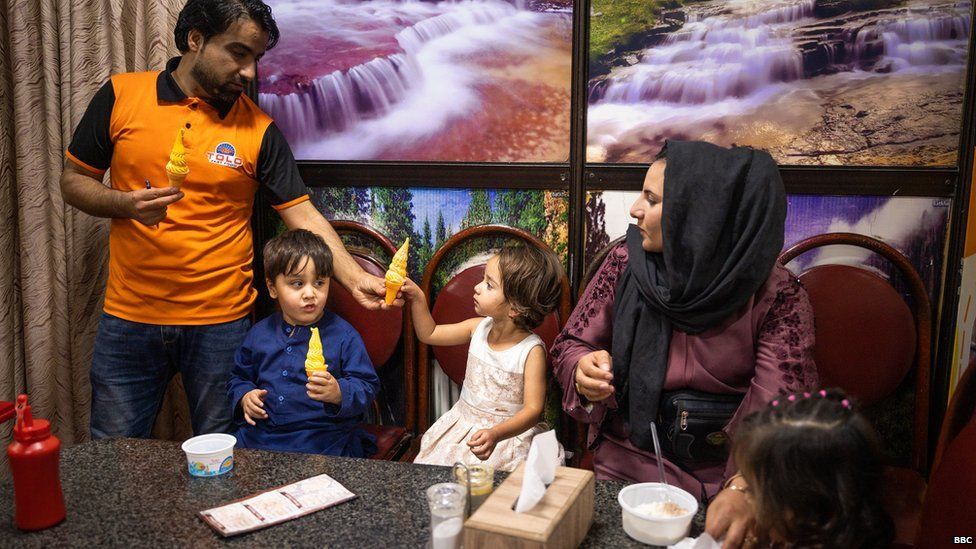
Afghan family enjoying an ice cream
"The excitement of eating ice cream as a child is equal to the excitement of travelling to space as an adult."
You often see queues at ice cream kiosks, crowds of women and children in cafes. These have become places to escape for a rare treat, a retreat. Now even public parks and women-only gyms and baths are off limits, "because women don't observe hijab", the strict dress code. All this means small spaces could get smaller still.
'Engaged at 13'
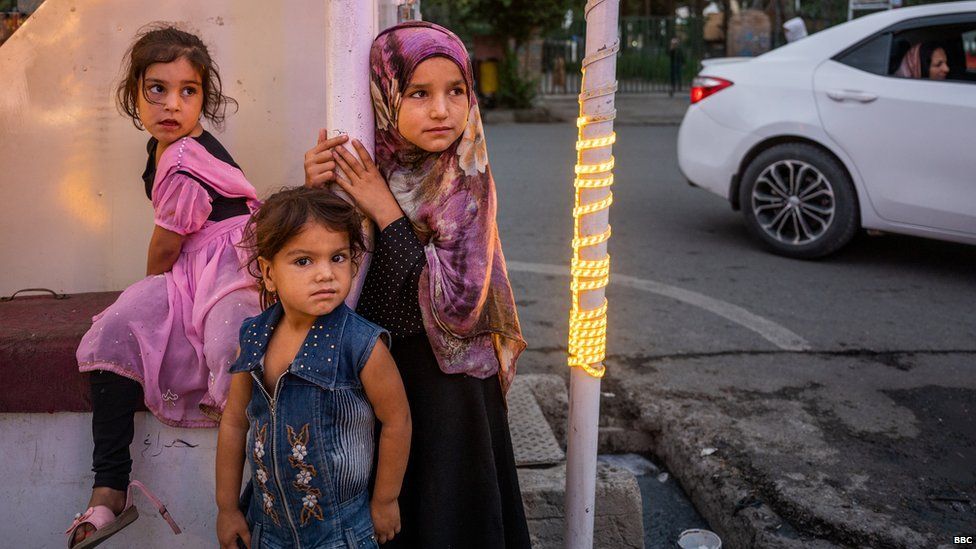
Girls waiting outside an ice cream restaurant in Kabul
"The public baths owner's daughter has been engaged. It's amazing. She's only 13. Her mother says the Taliban will never re-open schools, let her go to her home of luck... it seems that little girl is me... I was in despair the first time the Taliban arrived. I also accepted a forced marriage... the wounds still haven't healed... but I got up from the ashes and stood up."
It's repression on repeat. Afghan women recall, painfully, 1990s Taliban rule which also ended their education. Paranda, like many others, seized opportunities when the regime was toppled in 2001 - like going to school or getting divorced. A new generation of schoolgirls has grown up with even bigger dreams. Their pain is profound as their schools stay shut.
'Words men use against women'
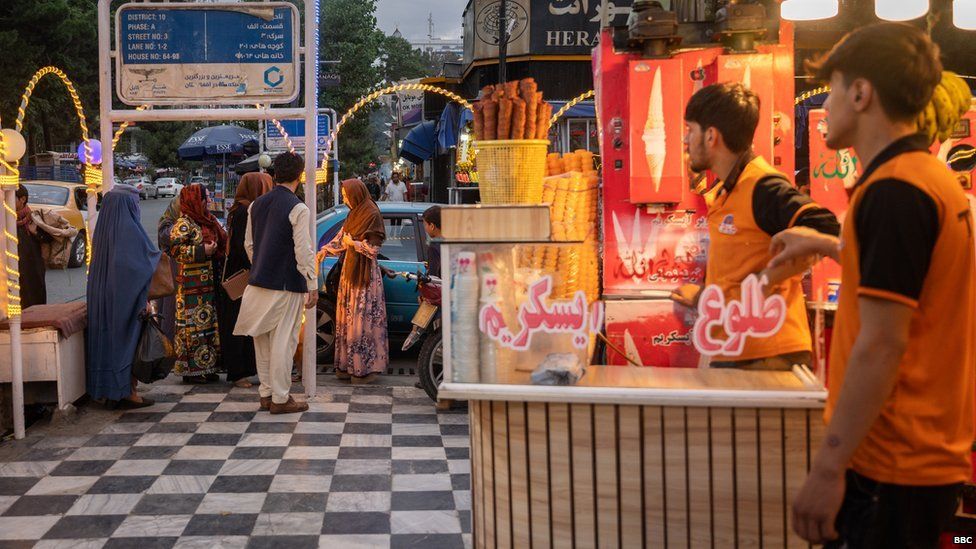
Kabul evening scene
"I had used social media but now I have locked my lips. I'm upset with my society, the naked words men use against women. I believe the roots of Afghan women's problems are not the governments which change and bring new rules… it is the evil thoughts of men toward women."
Afghan regimes come and go; patriarchy stays put. Afghan women have long lived with limits set by men. But advances of recent years are reversing - with what the UN describes as "staggering repression". It has a knock-on effect - reinforcing conservative family norms which keep women and girls under wraps.
'Believe a good country will come'
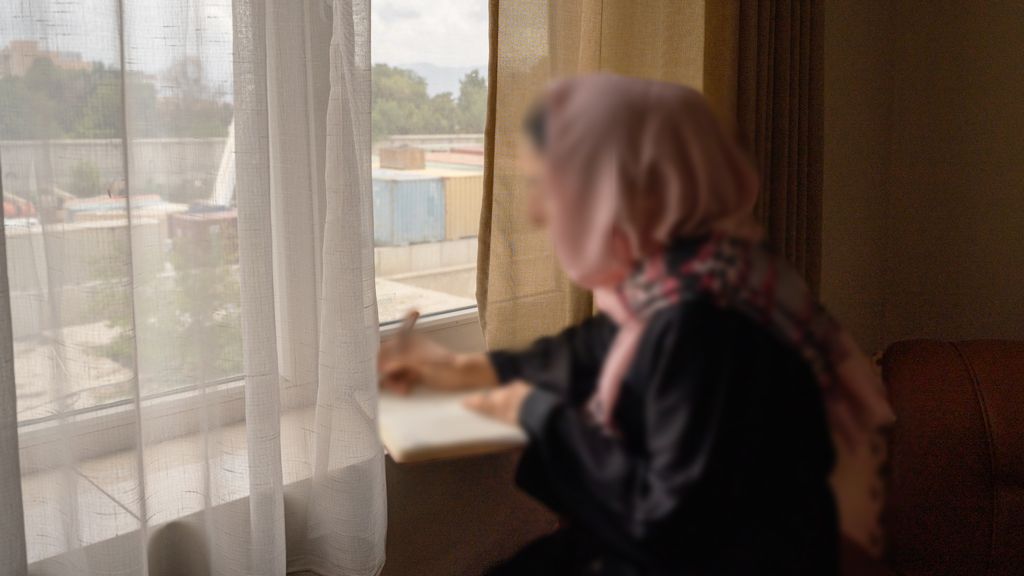
Paranda writing
"I must write about what is happening. There are so few media now… I believe that, someday, Afghanistan will be a very good country for women and girls. It will take time. But it will happen."
Paranda is a pen name - it means bird. Women like her, especially educated women in the cities, refuse to be caged. Many have fled. Many still hope to. Small crowds bravely protest. Even in remote corners of the country, I've met illiterate women seething inside about their prison-like life.
'Write to heal'
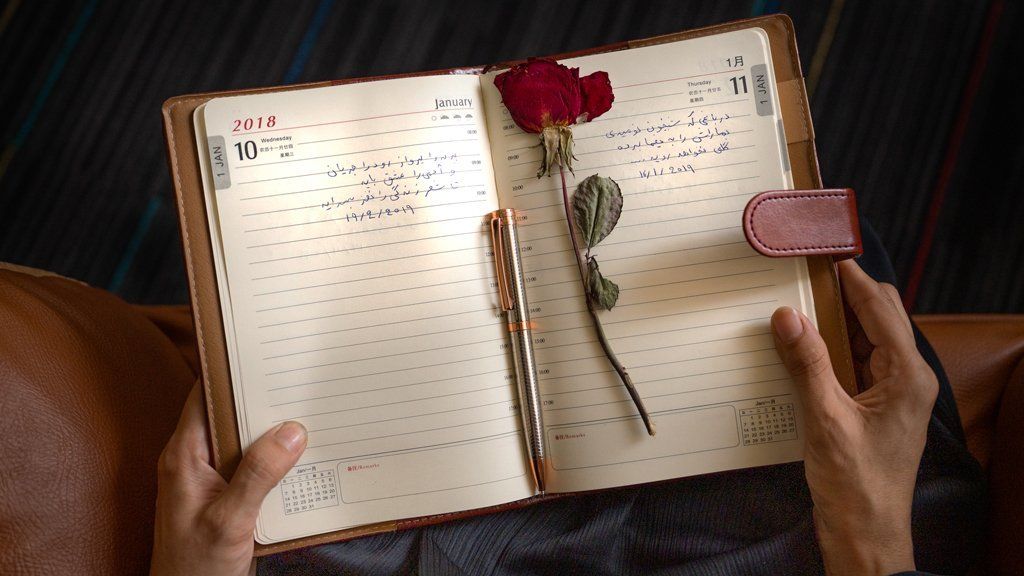
Paranda's diary
"Write! Why are you scared? Who you are afraid of? ... Maybe your writing can heal someone's soul… Your pen becomes the support of someone's broken arms and brings a little hope to some hopeless people," writes Sadaf.
A writer's life anywhere can be fraught with doubt and fear. For Afghan women, it is especially so - to find safe quiet corners to write, to forge a sense of self and purpose. Being published in "My Pen is the Wing of a Bird" gave new life to their words.
"One of the students introduced the book in beautiful words, and the best part was when she mentioned my name. All my students cheered for me. I write this as the most pleasant memory of my life."
'I am the breadwinner'
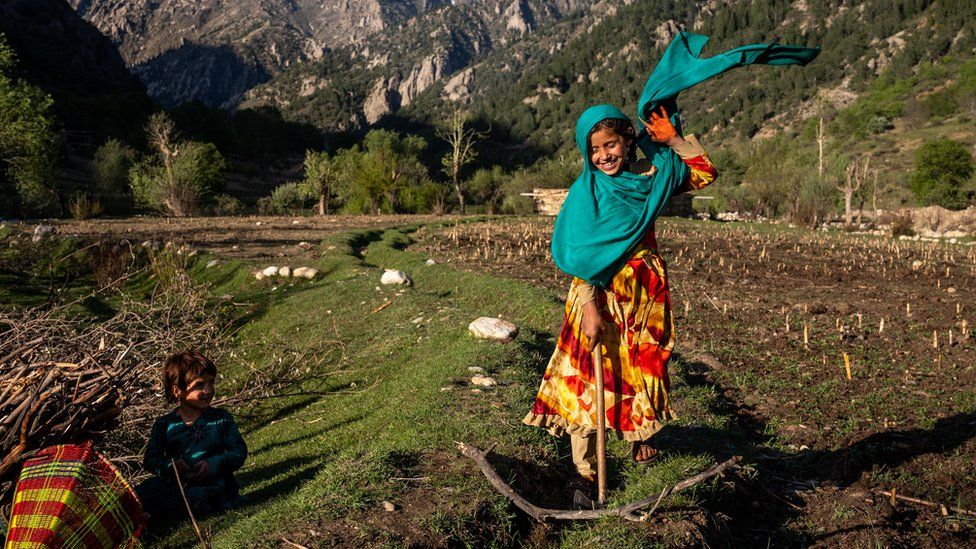
A young girl chops wood with her family in Nuristan province
"My belief tells me I should not worry about money as God may have something better for me. But God knows why I am worried. We are a family of 10, and I am the only breadwinner. I did not earn much better in the last Republic and it isn't good in this Islamic Emirate."
Women's work hasn't been wiped away. Some female doctors, nurses, teachers, policewomen are still in their jobs, mainly working with women and girls. Some businesswomen are still in business - but there's a crushing economic crisis. And doors have been slammed shut for women in most government ministries. With girls' high schools closed, the link between women and work is being severed.
'You are strong'
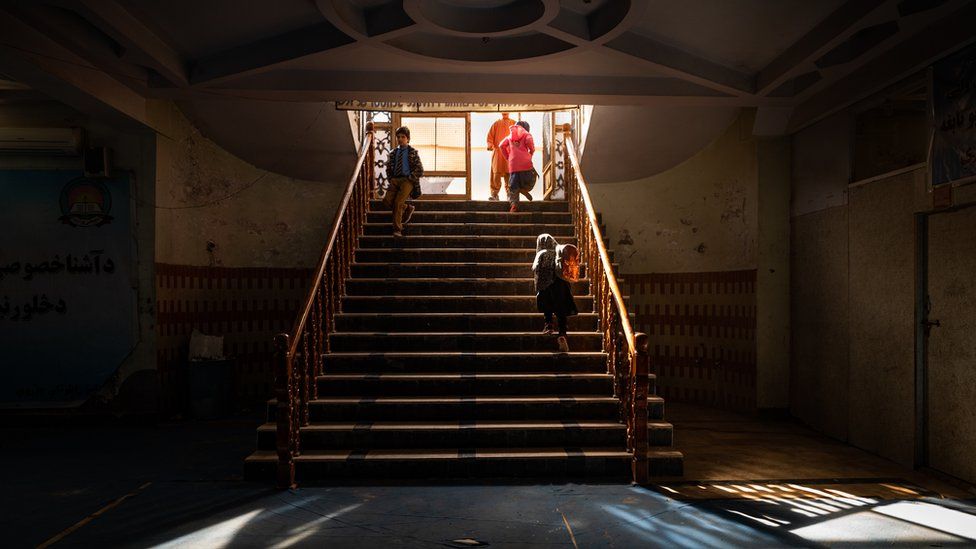
Kandahar scene
"I said, 'No, no! I cannot commit suicide.' I comforted myself, saying, 'Maybe you don't want to live. Still, your suicide will affect many other lives. Please be kind to them, you are strong, everything will be fine, you can make it. This too shall pass.'"
It's a whisper you hear everywhere. Suicide attempts - especially among young women - are reported to be on the rise, but it's hard to confirm. Families keep their secrets. Public hospitals are told to hide any proof. A UN agency tells me when they meet women in the provinces, this issue comes up. Forced marriages of young girls blocked from school is cited as a cause.
'When will this end?'
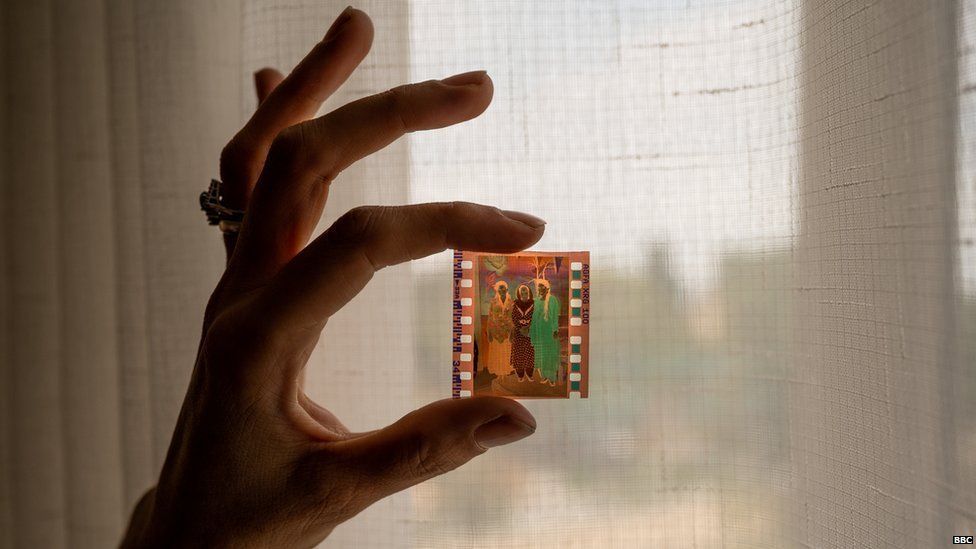
Paranda holds the negative of a photo taken in Afghanistan in the 1970s
"How can we be normal and not become crazy? How much pain can we tolerate? Finally, my heart accepts that this land has faced everything inhumane and cruel. But when will this end?"
More than one generation now has only known war - it's been more than four decades. The country lurches from one conflict to the next. Afghans keep daring to dream the next chapter will be better than the last. It's a story which never seems to end.
'Sparkles of hope'
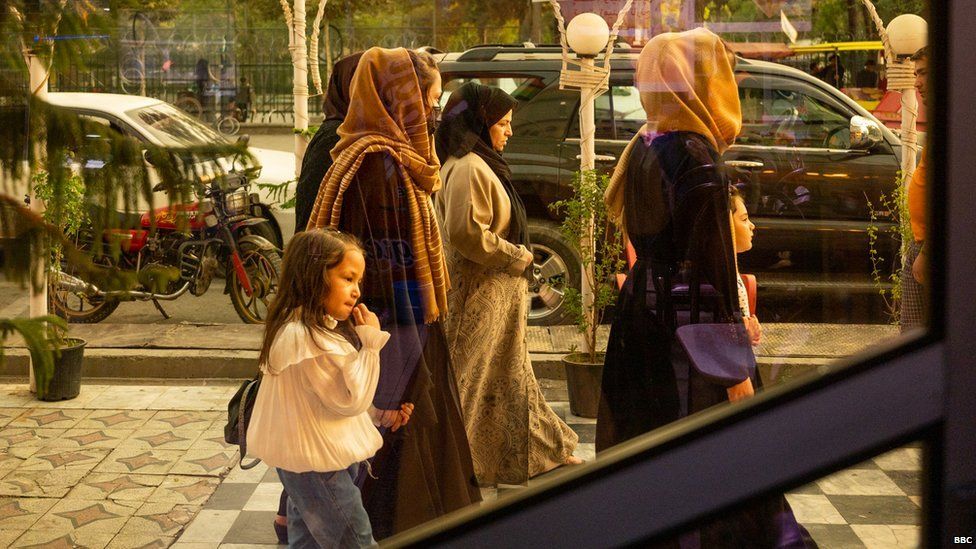
A group of women walk past a restaurant in Kabul
"I sprinkle sparkles of hope on the surface of my heart… There is a fire within me. There is a spirit within me telling me to fight. I have to hope the law of nature will send its orders in these dark days to change this darkness to a set of lights."
Afghans often say hope is the last thing to die. In recent years, before the Taliban took over, when everyday violence intensified, some said hope was killed too. But people who have lived through so much still hold fast to whatever hope still lives.
Photographs by Nanna Muus Steffensen
Untold's diary project is supported by the Bagri Foundation and the British Council. An anthology of these writers' short stories, My Pen Is the Wing of a Bird: New Fiction by Afghan Women, was published by MacLehose Press.
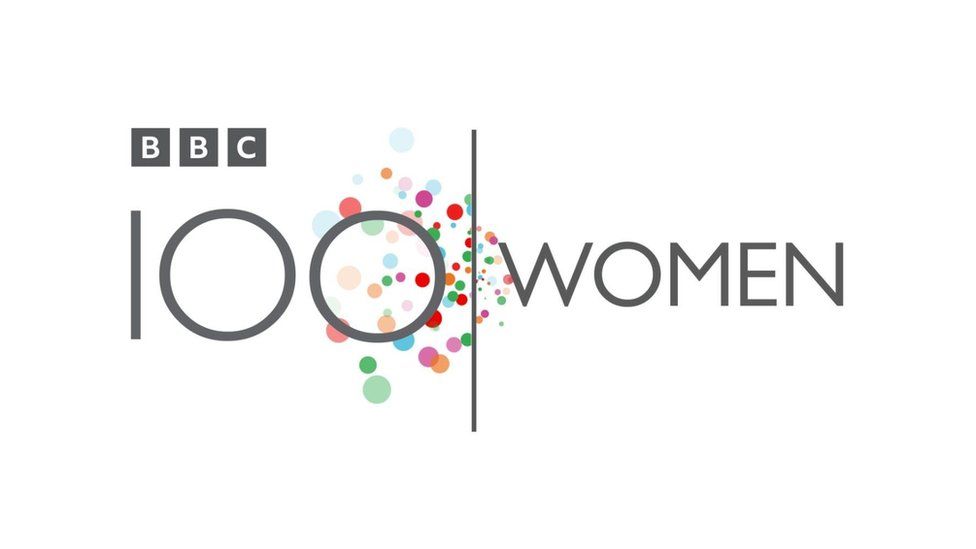
BBC 100 Women names 100 inspiring and influential women around the world every year. Follow BBC 100 Women on Instagram, Facebook and Twitter. Join the conversation using #BBC100Women.
BBC News
"My pen is the wing of a bird; it will tell you those thoughts we are not allowed to think, those dreams we are not allowed to dream."
At times, voices of Afghan women rise from the streets of Kabul and other cities in small, loud, protests. Often, they ring out in speeches by women now far away, outside Afghanistan. But mostly, their thoughts are only expressed quietly, in safe places. Or they fester in their heads as they try to reconcile their lives with the increasingly rigid rules of the Taliban government. They restrict what women wear, where they work, what they can do, or not, with their lives.
In the months before the Taliban returned, in August 2021, 18 Afghan women writers wrote fictional stories, drawn from real lives, and published early this year in the book, My Pen is the Wing of a Bird. Many Afghan women felt let down and left alone by the international community. But these writers used their pens and phones to comfort each other and to reflect on issues now faced by millions of women and girls. Here, two writers in Kabul, with pen names Paranda and Sadaf, shared their thoughts written in secret.
'Is a pink scarf a sin?'

Paranda walks down the street wearing her pink scarf
"Today I woke up with determination. When I chose my clothes, I decided to wear a pink headscarf to fight with the black headscarf I wear daily... is it a sin to wear a pink headscarf?"
Paranda prefers to wear pink, to feel feminine. But what women choose to put on is now a battleground. Strict Taliban edicts on modesty are enforced, often forcefully. In this traditional society, Afghan women aren't fighting against head-coverings - some just want their right to choose. You see it on the streets, in public spaces. A pink scarf. A sparkling trim. A little light in the dark.
'We cannot go back'
"Going backwards is not easy. Going forward is also a big hassle, should I be hopeful or not? We cannot go back," writes poet Hafizullah Hamim.
Afghan women have been leading the charge in rare public protests. Small brave crowds have taken to the streets in Kabul and other cities brandishing banners calling for "bread, work, freedom." They've been forcibly dispersed, and detained. Some have disappeared in detention. Across the border, in Iran, it's also the women leading calls for change with cries of "women, life, freedom" and a demand to end mandatory hijab. For Afghans, it's the right of women to work, for girls to be educated.
'Fear turns to anger'

Checkpoint in Mazar-i-Sharif
''The Taliban guard stopped our office car, he pointed at me… my heart beat faster, my body shook. It felt as if a wind was blowing across me... when our car moved away, it felt like the wind moved in another direction. My fear turned to anger."
It's the unpredictability that is so hard. Some Taliban guards are aggressive, some more accepting. Women's journeys are nerve jangling. For long distances over 72km (45 miles), a mahram - a male escort - is mandatory. Some Talibs invoke the rule at will - sending women home on a whim.
'Excitement of ice cream'

Afghan family enjoying an ice cream
"The excitement of eating ice cream as a child is equal to the excitement of travelling to space as an adult."
You often see queues at ice cream kiosks, crowds of women and children in cafes. These have become places to escape for a rare treat, a retreat. Now even public parks and women-only gyms and baths are off limits, "because women don't observe hijab", the strict dress code. All this means small spaces could get smaller still.
'Engaged at 13'

Girls waiting outside an ice cream restaurant in Kabul
"The public baths owner's daughter has been engaged. It's amazing. She's only 13. Her mother says the Taliban will never re-open schools, let her go to her home of luck... it seems that little girl is me... I was in despair the first time the Taliban arrived. I also accepted a forced marriage... the wounds still haven't healed... but I got up from the ashes and stood up."
It's repression on repeat. Afghan women recall, painfully, 1990s Taliban rule which also ended their education. Paranda, like many others, seized opportunities when the regime was toppled in 2001 - like going to school or getting divorced. A new generation of schoolgirls has grown up with even bigger dreams. Their pain is profound as their schools stay shut.
'Words men use against women'

Kabul evening scene
"I had used social media but now I have locked my lips. I'm upset with my society, the naked words men use against women. I believe the roots of Afghan women's problems are not the governments which change and bring new rules… it is the evil thoughts of men toward women."
Afghan regimes come and go; patriarchy stays put. Afghan women have long lived with limits set by men. But advances of recent years are reversing - with what the UN describes as "staggering repression". It has a knock-on effect - reinforcing conservative family norms which keep women and girls under wraps.
'Believe a good country will come'

Paranda writing
"I must write about what is happening. There are so few media now… I believe that, someday, Afghanistan will be a very good country for women and girls. It will take time. But it will happen."
Paranda is a pen name - it means bird. Women like her, especially educated women in the cities, refuse to be caged. Many have fled. Many still hope to. Small crowds bravely protest. Even in remote corners of the country, I've met illiterate women seething inside about their prison-like life.
'Write to heal'

Paranda's diary
"Write! Why are you scared? Who you are afraid of? ... Maybe your writing can heal someone's soul… Your pen becomes the support of someone's broken arms and brings a little hope to some hopeless people," writes Sadaf.
A writer's life anywhere can be fraught with doubt and fear. For Afghan women, it is especially so - to find safe quiet corners to write, to forge a sense of self and purpose. Being published in "My Pen is the Wing of a Bird" gave new life to their words.
"One of the students introduced the book in beautiful words, and the best part was when she mentioned my name. All my students cheered for me. I write this as the most pleasant memory of my life."
'I am the breadwinner'

A young girl chops wood with her family in Nuristan province
"My belief tells me I should not worry about money as God may have something better for me. But God knows why I am worried. We are a family of 10, and I am the only breadwinner. I did not earn much better in the last Republic and it isn't good in this Islamic Emirate."
Women's work hasn't been wiped away. Some female doctors, nurses, teachers, policewomen are still in their jobs, mainly working with women and girls. Some businesswomen are still in business - but there's a crushing economic crisis. And doors have been slammed shut for women in most government ministries. With girls' high schools closed, the link between women and work is being severed.
'You are strong'

Kandahar scene
"I said, 'No, no! I cannot commit suicide.' I comforted myself, saying, 'Maybe you don't want to live. Still, your suicide will affect many other lives. Please be kind to them, you are strong, everything will be fine, you can make it. This too shall pass.'"
It's a whisper you hear everywhere. Suicide attempts - especially among young women - are reported to be on the rise, but it's hard to confirm. Families keep their secrets. Public hospitals are told to hide any proof. A UN agency tells me when they meet women in the provinces, this issue comes up. Forced marriages of young girls blocked from school is cited as a cause.
'When will this end?'

Paranda holds the negative of a photo taken in Afghanistan in the 1970s
"How can we be normal and not become crazy? How much pain can we tolerate? Finally, my heart accepts that this land has faced everything inhumane and cruel. But when will this end?"
More than one generation now has only known war - it's been more than four decades. The country lurches from one conflict to the next. Afghans keep daring to dream the next chapter will be better than the last. It's a story which never seems to end.
'Sparkles of hope'

A group of women walk past a restaurant in Kabul
"I sprinkle sparkles of hope on the surface of my heart… There is a fire within me. There is a spirit within me telling me to fight. I have to hope the law of nature will send its orders in these dark days to change this darkness to a set of lights."
Afghans often say hope is the last thing to die. In recent years, before the Taliban took over, when everyday violence intensified, some said hope was killed too. But people who have lived through so much still hold fast to whatever hope still lives.
Photographs by Nanna Muus Steffensen
Untold's diary project is supported by the Bagri Foundation and the British Council. An anthology of these writers' short stories, My Pen Is the Wing of a Bird: New Fiction by Afghan Women, was published by MacLehose Press.

BBC 100 Women names 100 inspiring and influential women around the world every year. Follow BBC 100 Women on Instagram, Facebook and Twitter. Join the conversation using #BBC100Women.
No comments:
Post a Comment